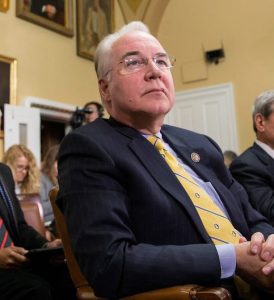
“The doctor will be with you shortly. He’s consulting with your insurance company for a diagnosis that’s allowed.”
While you may never hear those words in your physician’s office, it is sadly not a far-fetched scenario in today’s broken health care system. America is facing a mounting health care crisis, and federal restrictions are increasingly putting third parties between patients and their doctors.
As a physician, I have seen first-hand how our anti-trust laws and increasing government intervention are squeezing already tight access to health care. Federal anti-trust laws exist to ensure that a few powerful businesses are not able to use the muscle of a monopoly to restrain supply and artificially raise prices in the marketplace. These very laws, however, are exacerbating our health care crisis by denying physicians the ability to negotiate with insurance companies on behalf of patients’ medical needs.
In recent years, the rapid growth of consolidation in the insurance industry has put patients at risk by denying doctors the ability to treat patients with the highest quality care. The current system unevenly leverages what insurance companies are – and are not – willing to pay for against what the patient needs.
The Quality Health Care Coalition Act, reintroduced this Congress, allows physicians to negotiate together for health plan contracts. A critical part of fundamental health care reform, this legislation will allow increased choice for patients and doctors, greater access to care, and much needed relief from spiraling medical costs. A bipartisan effort behind this and broader, comprehensive health care reform is essential if we are going to restore a patient-centered health care system.
I can attest from my years as an orthopedic surgeon that allowing government or an outside party to dictate medical decisions is not in the best interest of patients.
We have seen substantial consolidation in the health insurance industry. In the past dozen years, the U.S. health insurance and managed care industry has seen more than 400 acquisitions. With this increased concentration of power, individual physicians are left facing large firms with little, if any, leverage in contract negotiations. Private health care insurers are important, and increased coverage in the private market is desirable. By sheer market size, however, doctors are on an uneven playing field. Too often patient needs are on the back burner as doctors face “take-it-or-leave-it” contracts.
In developing health plan contracts with insurance industry companies, guidelines for virtually every aspect of patient care are established. The inflexible terms of these contracts often include limits on procedures which doctors may offer – or even discuss – because insurers deem them unnecessary. This system allows insurance administrators to overrule the best judgment of highly trained medical professionals and suppress patient choice in care. I can attest from my years as an orthopedic surgeon that allowing government or an outside party to dictate medical decisions is not in the best interest of patients.
The Quality Health Care Coalition Act would provide a positive solution to these impediments to high quality health care. Allowing physicians to increase their bargaining power will ensure that business interests do not supersede the best interests of patients. Patients should have the ability to make independent, personal health care decisions with their doctors, rather than have a third party make these decisions for them. Negotiating on a level playing field will also ensure that doctors receive just compensation for their service and encourage a strong supply of medical professionals to meet tomorrow’s health care challenges and our nation’s changing demographics.
Providing anti-trust relief for physicians is not a partisan issue, nor a new one. Support for this common sense plan spans the ideological spectrum in Congress and has been discussed for years. In fact, the original version of the Quality Health Care Coalition Act passed the House of Representatives in 2000. Sponsored by retired Rep. Tom Campbell (R-CA), this legislation harnessed broad support by the current Chairmen of the Judiciary Committee, John Conyers (D-MI), and Ways and Means Committee, Charles Rangel
(D-NY).
Enactment of this legislation would be an important first step in restoring a patient-centered health care system. Yet we can no longer afford to fix our system one piece at a time. Years of incremental changes to federal health policy have caused the muddled system we see now. Instead, a complete overhaul of American health care is needed to create a structure that is free from third party interference. Many believe with validity that government and employers play as large a role as insurers in how doctors deliver care and how patients receive that care. Most believe this structure impedes access to quality physicians and care.
A complete overhaul of American health care is needed to create a structure that is free from third party interference.
Since coming to Congress, I have used my experience as a physician to craft legislation that would make fundamental changes to our nation’s health care system. The Comprehensive HealthCARE (Coverage and Reform Enhancement) Act is extensive legislation, including anti-trust relief, which would transition our health care system to one that is patient-centered through the formation of a defined contribution system. Under this structure, patients would truly own their coverage and choose a plan that fits their individual and family needs. Americans are currently beholden to employers or the government, if not insurers, to make health care decisions for them. This third party structure is fundamentally flawed. We need principled and far-reaching reform to correct this broken system.
A defined contribution health care structure grants the power of choice to those most intimately affected by health care decisions. When patients have the power to create individual health plans, the market is forced to be responsive to their specific needs, eliminating unwanted benefits and reducing costs. This legislation reforms our basic structure and makes positive changes in the lives of the uninsured, underinsured, and those drowning in growing medical costs.
The Quality Health Care Coalition Act and the Comprehensive HealthCARE Act are just two of the many patient centered legislative options that could bring our health care delivery system in to the 21st century.
Truly placing medical decisions in the hands of doctors and patients is the only way to restore a system that is innovative, responsive, affordable, accessible, accountable, and of the highest quality.
Tom Price, M.D. represents the 6th District of Georgia in the U.S. House of Representatives. Prior to coming to Congress, he was an orthopaedic surgeon for more than 20 years.




